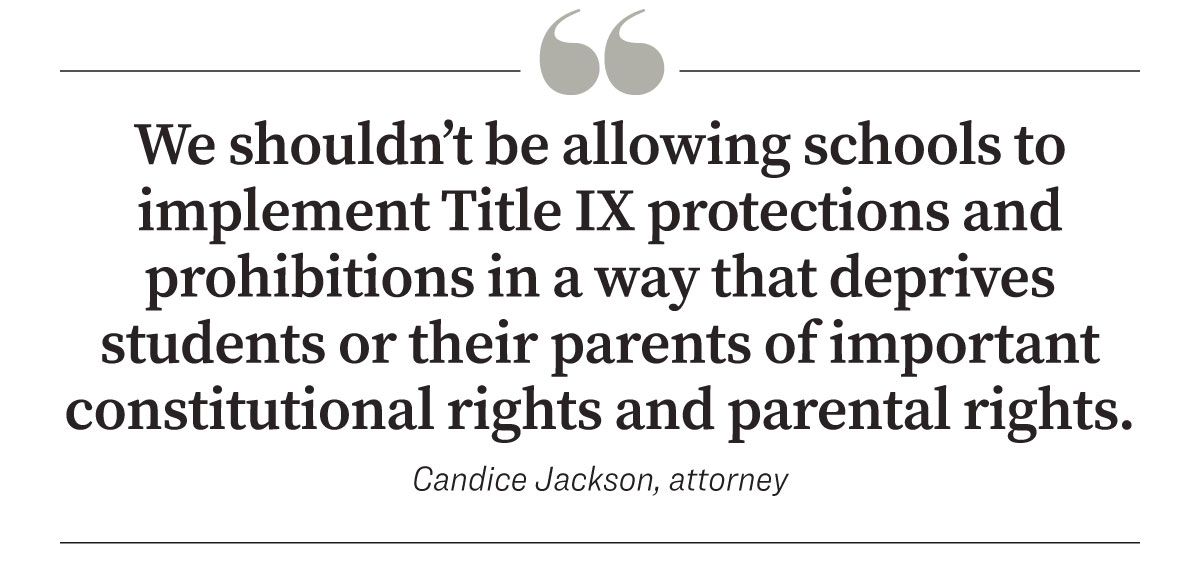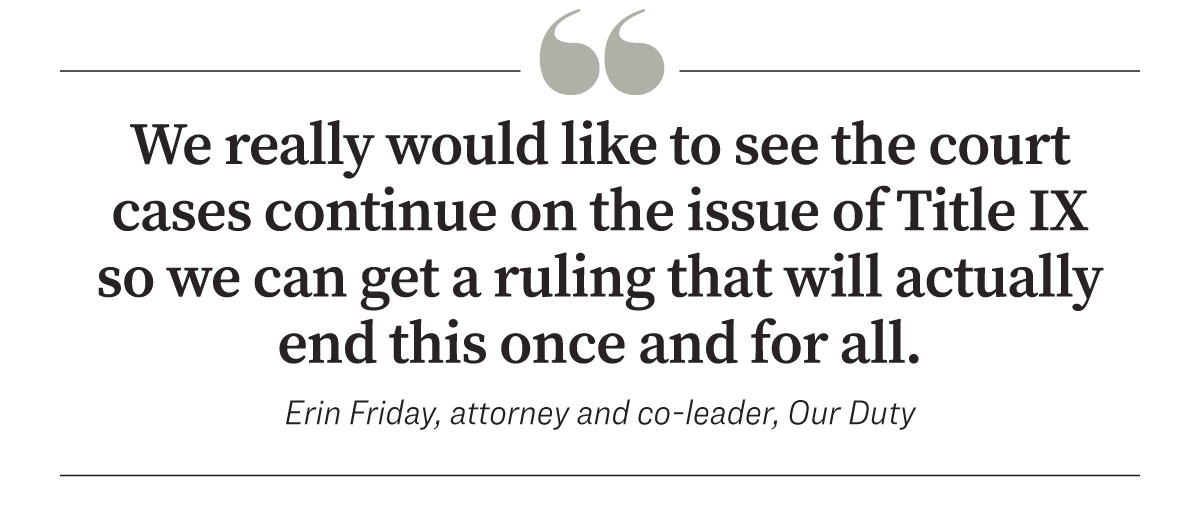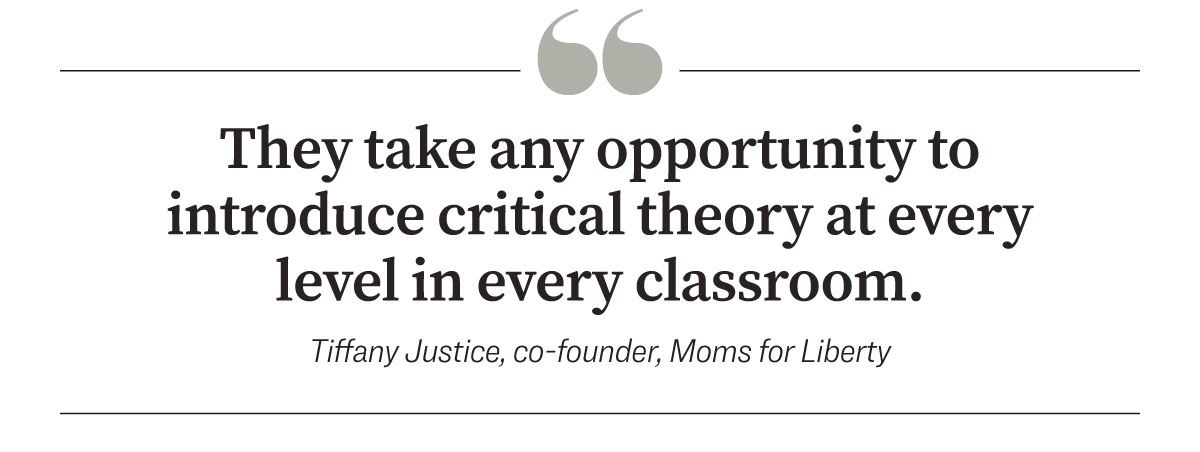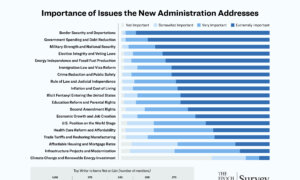President-elect Donald Trump has promised to ban from public schools critical race theory, stop boys who identify as transgender girls from playing in girls’ sports, and restore parental rights.
In March, Trump vowed on “day one” to undo the Biden administration’s expansion of Title IX protections to include “gender identity.”
Trump also stated on his campaign platform that he would cut federal funding for any school or program pushing critical race theory (CRT) or gender ideology. He also promised to “abolish teacher tenure for grades K–12 and adopt Merit Pay, cut the number of school administrators, adopt a Parental Bill of Rights, and implement the direct election of school principals by the parents.”
He has vowed to block federal funding to schools that refuse to comply and has threatened to abolish the U.S. Department of Education (DOE), although the latter would require an act of Congress.
On Nov. 19, Trump nominated Linda McMahon to lead the department, stating: “We will send education back to the states, and Linda will spearhead that effort.”
At an earlier campaign rally, he promised to stop the department from using taxpayer money to “indoctrinate America’s youth with all sorts of things that you don’t want to have our youth hearing.”
Several blue state leaders, teachers’ unions, and civil rights groups are opposed to Trump’s agenda and have vowed to work against it, including through the courts.
Becky Pringle, president of the National Education Association (NEA) union, responded to Trump’s win the day after the election.
“This is not the outcome we campaigned for, nor the future we wanted for our students and families, but it is the road through history we now must travel,” Pringle said in a press release.
“Today, we lament, and tomorrow, we organize because our students need us advocating for them now more than ever. Our values don’t change based on who wins or loses an election. And we will continue to advocate and organize for what we believe in with all our strength,” she said.
With Trump’s inauguration less than six weeks away, speculation about what he can or can’t deliver varies widely, and may hinge on court rulings and whether the federal education department is indeed abolished.

President-elect Donald Trump's nominee for secretary of education, Linda McMahon, meets with Sen. Tommy Tuberville (R-Ala.) in his office in the Russell Senate Office Building in Washington on Dec. 9, 2024. (Anna Moneymaker/Getty Images)
Civil Rights Office
Candice Jackson, an attorney who served as acting assistant secretary for strategic operations in the DOE’s Office of Civil Rights and deputy general counsel during the first Trump administration, said she expects Trump to roll out specifics on the first day of his administration to “directly go after schools that are determined to hide social gender transitions from parents.”“There is every potential for federal rules to come out of the education department that go after this problem,” she told The Epoch Times.
Although she believes the federal education department can order schools to alert parents if their child wants to undergo a social gender transition, such as change their name, Jackson said such an edict would almost certainly be challenged in court, especially by states like California that have already staked out its position legislatively.’
California has passed several pro-transgender laws over the past couple of years including Assembly Bill 1955, which bans parental notification policies on gender transitions at schools.
Schools that are determined not to involve parents in that kind of social gender transition intervention could easily be accused of fostering sex-based discrimination, Jackson said.
The Office of Civil Rights (OCR) is expected to play a pivotal role in the new administration. The OCR exists to ensure equal access to education and to enforce civil rights in schools, according to its website.
Sasha Pudelski, a lobbyist for AASA, the School Superintendents Association, said the OCR will generally “follow the lead of the president when it comes to civil rights enforcement.”
“We’ve seen this with Trump before. We’ve seen that with Obama, and with Biden. It’s just how it works,” Pudelski told The Epoch Times. “They determine the areas of emphasis … [and] how they want to investigate.”
Arne Duncan, education secretary during the Obama administration, did not respond to a request for comment.
While presidents have a lot of discretion, any claim must be tied to a civil rights law for the OCR to investigate it, Pudelski said.
“So, they can interpret Title IX as they see fit,” she said. “That doesn’t mean it won’t be challenged. I’m sure these things will be challenged, it’s just a question of the success of these challenges.”
Jackson said the legal battle over gender ideology could hinge on the Title IX statute of the Education Amendments Act of 1972.
Title IX is a civil rights law passed by Congress that requires schools that receive federal funding to provide equal educational opportunities to boys and girls, and protects their rights to have sex-separate sports teams and private spaces such as bathrooms and locker rooms.
In April, the Biden administration created a new rule to Title IX protections that adds “gender identity,” which allows boys who identify as transgender to play on girls’ sports teams and use girl’s locker rooms and bathrooms.
Education Secretary Miguel Cardona issued a statement at the time, saying the rule protects students and employees against sex discrimination “based on sex stereotypes, sexual orientation, gender identity, and sex characteristics.”
The Epoch Times reached out to the Trump transition team for comment, but did not hear back by publication time.
Parental Rights, Legally
The Supreme Court has historically upheld the right of parents to direct the upbringing of their children over statutes that intersect or interfere with that, Jackson said.“Issues that I worked on with Title IX the first time around very heavily involved free speech and due process,” she said. “We shouldn’t be allowing schools to implement Title IX protections and prohibitions in a way that deprives students or their parents of important constitutional rights and parental rights.”
The Supreme Court found in Troxel v. Granville (2000) that parents possess a “fundamental constitutional right to make decisions concerning the rearing of [their] own [children].”
The court also ruled in Parham v. J.R. (1979) that a government body attempting to “supersede parental authority” violates the Constitution and is “repugnant to American tradition.”
Nonprofit groups Moms for Liberty and Young America’s Foundation, outraged over the change to Title IX, sued the federal education department in May, claiming it tramples their First Amendment rights, threatens to punish K–12 and college students for voicing their beliefs in biological sex, and forces them to affirm views on gender fluidity, transgenderism, and queer theory, according to the Southeastern Legal Foundation (SLF), which represents the two organizations.

Mom's for Liberty co-founder Tiffany Justice speaks with former public defender Maud Maron, author and former gymnast Jennifer Sey, former congresswoman Tulsi Gabbard, and Texas State Rep. Shawn Thierry at the 2024 Mom's for Liberty National Summit in Washington on Aug. 30, 2024. (Dominic Gwinn/Middle East Images/AFP via Getty Images)
The states of Kansas, Wyoming, Utah, and Alaska joined the Moms for Liberty and Young America’s Foundation et al. v. U.S. Department of Education case, and last summer, the 10th Circuit federal court granted a preliminary injunction to halt enforcement of the new regulation in those states and in every school attended by members of Young America’s Foundation and the children of Moms for Liberty members.
Kimberly Hermann, SLF’s executive director, stated in July that the court order was “a huge win for individual liberty, equality, and parental rights.”
Supreme Court Case
Meanwhile, on Dec. 4, the U.S. Supreme Court heard oral arguments in a case, U.S. v. Skrmetti, over whether a Tennessee law violates the Constitution by banning so-called gender-affirming care for minors, which can include opposite-sex hormone medication and surgeries.The federal government claims the ban constitutes sex-based discrimination and is asking the court to overturn an appeals court decision upholding the Tennessee law. Tennessee argues such medical interventions are dangerous to minors and the state has a compelling interest to protect them.
The Skrmetti case is important because it will determine “whether there is such an entity as a transgender child, as opposed to a child with a mental health issue,” said Erin Friday, an attorney, co-leader of Our Duty, and lifelong Democrat who voted for Trump in November, “because of the trans issue.”
Friday has a daughter who once “thought that she was a boy,” and later changed her mind.
If the Supreme Court rules in favor of Tennessee, Friday expects to see legislation and rulings emerge in other states that ban transgender medical interventions for minors.
Moms for Liberty co-founder Tiffany Justice said she is hopeful the Title IX rule will be struck down by the courts, so it’s not subject to change at the whim of a presidential executive order.
“We really would like to see the court cases continue on the issue of Title IX so we can get a ruling that will actually end this once and for all,” she told The Epoch Times. “That would be the best outcome.”
Both Friday and Jackson predict that the Supreme Court will ultimately be forced to make a decision around sex and gender.
“The Supreme Court has been kicking the can down the road for a long time. They can’t anymore,” Friday said.

Erin Friday (C), an attorney on the executive committee for Protect Kids California, speaks at a press conference in Sacramento, Calif., on Jan. 3, 2024. (Courtesy of Jay Reed, Protect Kids California)
Justice said she also hopes Congress will act to protect girls’ and women’s sports nationwide.
Meanwhile, the issue is being battled in the court system.
On Nov. 13, a women’s college volleyball coach and 11 female athletes across five universities filed a lawsuit against the Mountain West Conference, its commissioner, and three officials at San Jose State University (SJSU), alleging Title IX and First Amendment violations over the addition of Blaire Fleming, a male who identifies as female, to the San Jose Spartans team in 2022.
“We won’t ignore the differences between males and females, and we won’t be silenced. I’m grateful to take this fight to court,” one of the plaintiffs, San Jose State co-captain Brooke Slusser, said in a statement.
Justice said she would like to see the Family Education Rights and Privacy and the Protection of Pupil Rights Amendment laws amended to build more accountability into the education system.
“If there’s a violation, you go and you tell the school, and then the school has to investigate themselves, basically, and that doesn’t work. It’s like the fox watching the hen house,” she said. “I’m really hopeful that we’re going to see a lot of movement in that area. Then parents will have some recourse when there are secrets being kept from them in schools, or when their children are being indoctrinated or taken off course.”
On the other side of the argument, groups such as the National Women’s Law Center are gearing up to oppose restrictions or reversals to policy.
Fatima Goss Graves, president and CEO of the group, said the National Women’s Law Center is committed to lead the fight for “gender justice” and called on advocates to “raise their voices.”
“We are all facing the realities of a new administration and the agenda they intend to implement,” Graves stated in a press release on Nov. 6.
“Over the next four years, it is essential for our institutions to exercise their authority to curb any moves toward authoritarianism, and advance issues that matter most to women and families.”
Shiwali Patel, director of safe and inclusive schools for National Women’s Law Center, didn’t respond to an interview request by The Epoch Times.

The U.S. Supreme Court in Washington on June 26, 2022. (Brandon Bell/Getty Images)
Critical Race Theory
Trump has also said he wants classrooms to embrace a more patriotic view of America and abandon critical race theory (CRT).CRT is based on the perception that racism and white supremacy continue to be systemic in American institutions and categorizes people into oppressors or oppressed based on race.
Critics said the theory distorted American history, portrayed white people as inherently racist, and encouraged a dependent mentality among minorities.
But the DOE cannot mandate curriculum, graduation requirements, or teacher and administrator credentials.
“The federal government has long been legally prohibited from being involved in controlling school curricula … and that’s not going to change anytime soon,” Jackson said. “I don’t see there being an appetite for changing that law congressionally.”
But, if school curricula outright violate civil rights and non-discrimination provisions, “potentially, the federal government education department can have something to say about it,” she said.
If the federal government does weigh in, it wouldn’t take the approach of trying to dictate to local schools that they must follow a certain curriculum, but rather that federal funds cannot be used to promote discrimination on the basis of race, sex or disability, she said.
Much of the CRT and gender ideology affecting children isn’t necessarily folded directly into the curricula but is introduced at a broader policy level and then seeps into the school atmosphere though non-curricular vehicles such as clubs and trainings, she said.
“There are other ways to lean in and try to identify and uproot a problem in schools that crosses over into violating these civil rights laws that the federal government can enforce,” Jackson said.
The American Civil Liberties Union (ACLU) has already stated it will represent schools that teach CRT and gender ideology.
Anthony Romero, ACLU’s executive director, noted on Nov. 6 that the organization filed 434 legal actions against the first Trump administration, and that a second one “represents a clear and present danger to our democratic norms, processes, and institutions.”
Friday said the federal government may not have the power to decide what local schools teach but California school districts have been granted what’s known as “local control,” which allows school boards more autonomy to set curricula even though the state sets policy direction.

Demonstrators hold up signs during a rally against “critical race theory” (CRT) being taught in schools at the Loudoun County Government center in Leesburg, Va., on June 12, 2021. (Andrew Caballero-Reynolds / AFP via Getty Images)
She said the state has undermined local control for years “by passing more and more laws requiring critical race theory and gender to be in social sciences and sex ed, and now it’s in every class, including math.”
In 2021, the 11-member California State Board of Education which oversees the state Department of Education — adopted a 700-page Ethnic Studies Model Curriculum, which includes guiding values such as “challeng[ing] racist, bigoted, discriminatory, and imperialist/colonial beliefs and practices on multiple levels” and “struggle for social justice … and build new possibilities for a post-racist, post-systemic-racism society that promotes collective narratives of transformative resistance, critical hope, and radical healing.”
The state passed Assembly Bill 101 in 2021, which makes ethnic studies coursework a requirement for high school graduation as of 2030, and at least 20 California school districts have adopted the optional Liberated Ethnic Studies Model Curriculum (LESMC), a more radical version of ethnic studies.
Whether Trump “can with the swipe of a pen” change these policies is debatable but he can use “the stick” to withhold federal funds from schools that do not comply “to get some of this anti-parent, anti-American teaching out of our schools,” Friday said.
Justice of Moms for Liberty says many school administrators who say CRT isn’t taught in schools are obfuscating.
“They’re teaching its generative themes,” she said. “They take any opportunity to introduce critical theory at every level in every classroom.”
She said she views Trump’s election win as “the American people rejecting communism and saying, ‘No, we will not allow our children to be used as a weapon against us in our country.”
Justice is optimistic that the Trump administration will push back against gender ideology, CRT, and social justice issues to help teachers get back to the basics core subjects of academic learning such as reading, writing, and arithmetic.
“Teaching kids to read should truly be a bipartisan effort,” she said.
“Eighty percent of the kids that come into contact with the juvenile justice system in America are functionally illiterate, and the Department of Justice has said there is an inextricable link between a life of poverty and struggle and crime and illiteracy,” she said.
The National Assessment of Adult Literacy (NAAL) shows that about two-thirds of students who cannot read proficiently by the end of the fourth grade will end up in jail or on welfare, and 85 percent of all juveniles involved with the juvenile court system are functionally low literate.
Liz King, senior program director for education equity at the Leadership Conference on Civil and Human Rights did not respond to a request for comment; nor did Lanae Erickson, senior vice president for social policy and politics at Third Way, a centrist Democratic think tank.

















